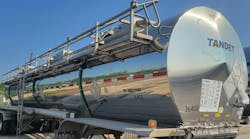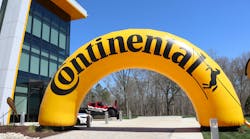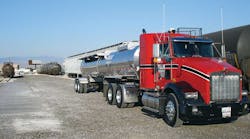Over Five decades ago, Geoff Cross, then a recently-married young man of 25, decided to leave his native United Kingdom and seek a new life in Canada. However, those plans were changed as soon as he set foot in the United States.
At the time, he did not realize his destiny lay, like so many immigrants before him, in California where he eventually would establish Bulk Transportation, a tank truck carrier and intermodal service provider.
“My wife and I made our way from the East Coast over a period of four years by parking cars, washing dishes, canning lobsters, and driving trucks,” says Cross. “We were looking for anything that could make our dreams come true.”
Those dreams eventually came to fruition in 1958 in California, where Cross and a partner founded Brown and Cross Trucking to haul clay.
“We drove two used truck trailers and an old track loader,” recalls Cross of the early days. “We delivered clay to a brick yard. Later, we started hiring drivers, but in 1961 we lost the contract on clay, so we started hauling rock, sand, and gravel.”
By 1966, he had become the sole owner of the company, now known as Bulk Transportation, with one power unit and five dry bulk trailers. On September 27, 2008, the family celebrated the company's Golden Anniversary with an open house at the Walnut, California, headquarters.
New beginning
This all began more than 50 years earlier when Cross was trying to get a fledgling trucking company out of the nest in Manchester, England. Before starting the company, Cross had served more than two years on a frigate in Her Majesty's Royal Navy. Just as the Navy wasn't what Cross was looking for in a career, neither was the trucking company in England— where entrepreneurship at that time wasn't always rewarded.
By 1954, Cross was married and he, and now his late wife, Alma, had made the decision to set sail for America. “That decision eventually proved to be a good one,” Cross says. “But it wasn't immediate.”
Today, Cross, 78, has handed over the company reins to his son, Gary, who serves as president and chief executive officer. His daughter, Susan Duffield, corporate secretary, also is active in the administration. Nevertheless, he is active in other ventures and stays apprised of the operation.
With all of the Bulk Transportation diversified interests, the carrier has built a strong management team led by Dwight Anderson, vice-president and director of logistics and marketing; John Erwin, vice-president of operations; and Karen Finley, chief financial officer.
Hauling history
The company's trucking history commenced with sand and gravel, but by the mid-1970s Cross was making a move to the bulk side of the industry. He purchased a few MC331 tank trailers to haul ammonia and propane. About the same time, the carrier bought a trucking company that transported animal fats.
“This area has changed a lot since then,” says Cross. “While feed and grain hauling once was dominated by trucks, most of it now comes in by rail. There are no more slaughter houses in Los Angeles where the fats once originated.”
Cross had expanded his operation in dry bulk commodities in the late 1960s to hauling grain, feed, fertilizer, as well as dry products requiring pneumatic trailers. Later, Cross recognized the market was changing and made the move to hauling products such as acids, chlorine, and caustics. “At the time those products were transported in drums, but tank trucks soon took over the market for large volumes,” he says.
By 1970, the Walnut acreage had been acquired for the corporate offices and a terminal. Company acquisitions soon followed that resulted in the addition of more tractors and tank trailers. Bulk Transportation's growth was achieved by serving the same customers in other geographic locations as they, too, expanded their operations, Cross notes.
By 1991, Bulk Transportation had refocused its business emphasis on the liquid and chemical sector and sold most of its dry bulk operations. Today, products such as caustic soda, sulfuric acid, and hydrochloric acid are transported for mining companies and industrial and specialty chemical processors.
Transload division
As the carrier grew, it soon became apparent that bulk transloading could develop into a viable and compatible division. Bulk Transportation opened its first transload facility in 1980 in Stockton, California. Now the carrier operates six truck and rail transfer stations — in Arizona, California, Nevada, and Oregon with about 100 railcar spots companywide. The facilities are typically served by Union Pacific Railroad Corp and Burlington Northern Santa Fe Railway. Products transferred include liquid chemicals, solvents, acids, and other water treatment chemicals.
“The industry needs more transloading facilities in Southern California, but the state won't allow it,” Cross notes.
While the transloading side of the business is extensive, the trucking division remains the company's foundation. With all the expansion through the years, Bulk Transportation runs 257 power units and 400 tank trailers.
Terminals are located in Buckeye and Safford, Arizona; Walnut, Compton, and Stockton, California; Carlin, Henderson, and North Las Vegas, Nevada; Portland, Oregon; Pasadena (Houston), Texas; Salt Lake City, Utah; and Tacoma, Washington.
Vehicle fleet
Bulk Transportation has standardized on Kenworth tractors with Cummins 370-horsepower engines and nine- and 10-speed Eaton Fuller transmissions. Running gear includes Meritor steering axles and Eaton drive tandems with a 3.70 ratio, Eaton brakes, Spicer clutches, Kenworth suspensions, and Alcoa aluminum wheels. Owner operator tractors build the tractor fleet to over 200.
The company's 250 Polar DOT407 tank trailers are equipped with Girard pressure-relief vents and vacuum breakers and Betts discharge outlets. Running gear includes Hendrickson air ride suspensions, Alcoa aluminum wheels, and Michelin tires. Tank trailers also are equipped with the SkyBitz GLS 210 satellite tracking system that is integrated with TMW Systems software for compiling data.
In addition, Heil and Beall tank trailers and Reinke chassis, along with others trailers, account for over 400 in the fleet.
In addition to Bulk Transportation, Geoffrey and his son, Gary, purchased DTI and West Coast Bulk that operate as separate companies. Together the three entities with a total of 200 drivers provide specialized highway tank vessels to transport chemicals (liquid and dry), food products (liquid and dry), mining commodities, and specialized rail to truck off-loading equipment.
Bulk Transportation also has intermodal services for international and domestic tank containers requiring specialized handling. Another service provides hauling a tank trailer owned by Phos-Chek used in forest firefighting.
Maintenance operation
Complementing the transportation operation is Bulk Transportation's vehicle maintenance. The shop in Walnut is certified to do Kenworth warranty work, and tank trailer repairs are provided at the site in a separate area. The trailer shop holds an “R” stamp for tank repair and fabrication. Other shops are in Stockton, Compton, and Victorville, California, and Safford, Arizona.
In addition to the maintenance facilities, the Walnut terminal has an in-house designed tank wash rack equipped with Spraying System spinners.
About 50 trailers can be cleaned daily, and approximately 60% of the fleet is cleaned in house. The cleaning system has Peerless pumps and a Miura 70-horsepower boiler. Cleaning agents are from Advanced Blending.
For worker protection, the tank wash has a bar across the top of the length of the rack for attaching a safety harness. Trailers are positioned in such a way that the dome and/or clean-out entrance is surrounded by the drop-down walkway with guard rails.
The cleaning facility provides commercial service as well as in-house service, just one more example of Bulk's growth and diversification into transportation-related businesses.
Future projections
As for the future, Cross has a good perspective garnered from the last 50 years. He expects the tank truck industry to remain vigorous with a few rough spots along the way. At the same time, Cross predicts growth in the use of tank containers. “They reduce the transportation risk because they are shipped long distances by rail,” Cross says. “I think in the next few years we will see no anhydrous ammonia being moved by truck.”
Cross envisions continuing opportunities for moving bulk products with a variety of methods. As an example, Bulk Transportation currently hauls box containers equipped with interior bladders for holding wine shipped internationally.
Cross also has some wisdom to impart for running a successful company. “The main thing for anyone's business is to let people know what you are doing,” he says. “That means your customers, your creditors, your suppliers — anyone you work with. That helps to build trust and that is essential.”









